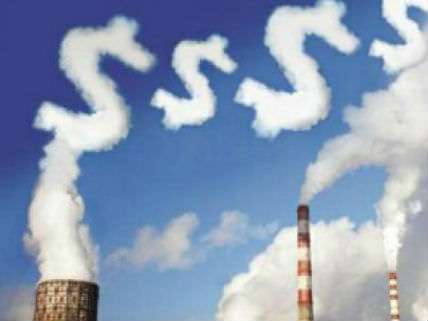Carbon Markets or Recessions: Which Cuts Greenhouse Gases More?
The global financial crisis is responsible for 80 percent of Europe's GHG reductions.

In 2005, the European Union launched the world's largest carbon market. The European Trading Scheme (ETS) aimed to reduce member states' carbon dioxide emissions by putting a price on them. Under the United Nations' Kyoto Protocol, the European Union agreed that by 2012, it would cut its greenhouse gas (GHG) emissions by 8 percent below the levels emitted in 1990. In 2012, the E.U. announced that it had achieved that goal.
This year the non-profit Climate Group hailed the ETS, citing the fact that "from 2005 to 2013 the sectors covered by emissions trading have reduced their emissions by 13%." But it also acknowledged that "the economic recession could also have played a role in emissions reductions." In other words, part of the reduction might just be a result of people using less energy as the Great Recession hammered their economies. So how much of the European Union's emissions reductions can be attributed to the effects of the ETS and how much to the global economic recession?
A new study by the University of Barcelona economists Germá Bel and Stephan Joseph, published in the journal Energy Economics, tries to answer that question.
The ETS is a cap and trade system that applies to around 45 percent of the EU's total greenhouse gas emissions. About 11,000 big emitters, including electric power companies, oil refineries, steel mills, cement manufacturers, pulp and paper mills, and the makers of bulk organic chemicals, are required to cover their emissions with emission allowances. Each allowance permits the emission of one metric ton of carbon dioxide. Most of the allowances were handed out to companies for free.
In the initial phase, between 2005 and 2007, countries allocated far more allowances than there were actual emissions. Consequently, the price of allowances fell to essentially zero. After 2008, the EU tightened up the issuance of allowances, but carbon market prices have continued their drift ever downward.
Examining emissions data from 2005 to 2012, Bel and Joseph find that the European countries cut their overall emissions by 294 megatonnes annually (a megatonne is equal to a million metric tonnes), with countries averaging a reduction of just under 12 megatonnes each. But "the most striking revelation," they write, "is the impact of the economic downturn on industrial GHG emissions, with an average reduction per country of 10.174 MgT of GHG emissions in sectors under the EU ETS between 2008 and 2009." This massive one-year reduction amounts to 86 percent of the total GHG abatement achieved between 2005 and 2012.
Interestingly, the United States also experienced a sharp 6.5 percent drop in its greenhouse gas emissions in 2009. Of course, this steep fall in emissions meant that emission permits were once again oversupplied, resulting in a price collapse in the carbon market.
To get a clearer idea of how much GHG abatement can be attributed to the European carbon market, Bel and Joseph estimate ETS reductions by comparing the production trends in industrial sectors included in the carbon market with those sectors not covered in the ETS. They also look at consumption of electricity, oil, natural gas, and coal over the period. After running the numbers, the two find that "the total share of emission abatement due to the EU ETS is about 61 MgT of the 294 MgT of the total reduction of emissions" in the European Union. In other words, the carbon market was responsible for only about 21 percent of the overall emissions reductions.
So if the global financial crisis hadn't suppressed the European Union's industrial production and energy consumption, it would most likely have failed to meet its Kyoto Protocol emission reduction obligations. An interesting question is whether causality would work the other way: Would trying to impose stringent limits on greenhouse gas emissions spawn a recession? We may have the opportunity to find out, since the nations of the world are supposed to agree to a binding greenhouse gas reduction treaty at the United Nations' climate change conference in Paris later this year.


Show Comments (65)